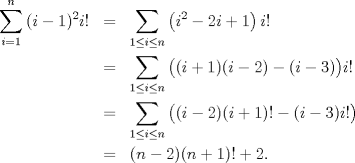|
|
|
|
|
|
|
  |
| Gaston Burrull |
 May 26 2009, 09:36 PM May 26 2009, 09:36 PM
Publicado:
#1
|
|
Invitado |
![TEX: \begin{center}<br />MAT1103 - Álgebra y Geometría\\<br />Control 2 - Martes 26 de Mayo de 2009\end{center}<br />\begin{enumerate}<br />\item Demuestre que la expresión $4^n+15n-1$ es divisible por $9$, $\forall n\in \mathbb{N}$.<br />\item Sea la sucesión de Fibonacci definida como:<br />\[ f_n= \begin{cases}<br />0 & \text{ si } n = 0 \\<br />1 & \text{ si } n = 1 \\<br />f_{n-1} + f_{n-2} & \text{ si } n > 1 \\<br />\end{cases}\]<br />Demuestre que $\displaystyle f_n\leq \left(\frac{7}{4}\right)^{n-1}.$<br /><br />\textbf{Ayuda:} Use el hecho que $\displaystyle\left(\frac{7}{4}\right)+1\leq\left(\frac{7}{4}\right)^2.$<br />\item Resuelva la siguiente sumatoria:<br />\[\sum_{i=1}^n (i-1)^2\cdot i!\]<br />\end{enumerate}<br />](./tex/e32a722995234457fc4a91659b15cf47.png)
|
|
|
|
 May 26 2009, 09:53 PM May 26 2009, 09:53 PM
Publicado:
#2
|
|
 Dios Matemático Supremo Grupo: Usuario FMAT Mensajes: 1.313 Registrado: 28-June 07 Miembro Nº: 7.123 Nacionalidad:  Colegio/Liceo:  Sexo:  |
Aqui va el 3)
![TEX: $$\sum\limits_{i=1}^{n}{(i-1)^{2}i!}=\sum\limits_{i=1}^{n-1}{(i)^{2}(i+1)!}=\sum\limits_{i=1}^{n-1}{(i+3-3)\cdot (i+2-2)(i+1)!}=\sum\limits_{i=1}^{n-1}{(i+3-3)\cdot \left[ (i+2)!-2(i+1)! \right]}$$](./tex/107bf1465c1b106533b90ee6aaf3a164.png) ![TEX: $$\sum\limits_{i=1}^{n-1}{(i+3-3)\cdot \left[ (i+2)!-2(i+1)! \right]}=\sum\limits_{i=1}^{n-1}{(i+3)!-2(i+3)(i+1)!-3(i+2)!+6(i+1)!)}$$](./tex/3cf311510f445ad4b256cb03008b4ab1.png)      -------------------- Hay dos cosas infinitas: el Universo y la estupidez humana. Y del Universo no estoy seguro
|
|
|
|
 May 26 2009, 10:07 PM May 26 2009, 10:07 PM
Publicado:
#3
|
|
 Dios Matemático Supremo Grupo: Usuario FMAT Mensajes: 3.413 Registrado: 13-March 08 Desde: Al frente del mundo Magico Miembro Nº: 16.846 Nacionalidad:  Colegio/Liceo:  Universidad:  Sexo:  |
Aqui va el 1)
![TEX: \[<br />\begin{gathered}<br /> {\text{PDQ: }}9\left| {4^n + 15n - 1{\text{ }}\forall n \in \mathbb{N}} \right. \hfill \\<br /> \hfill \\<br /> {\text{Caso base }}n = 1{\text{ es trivial}} \hfill \\<br /> {\text{HI: Supongamos que }}4^n + 15n - 1 = 9k \hfill \\<br /> {\text{Demostremoslo para }}4^{n + 1} + 15\left( {n + 1} \right) - 1 \hfill \\<br /> 4^{n + 1} + 15\left( {n + 1} \right) - 1 = \hfill \\<br /> = 4 \cdot 4^n + 15n + 14 \hfill \\<br /> = 4 \cdot 4^n + 60n - 45n + 18 - 4 \hfill \\<br /> = 4\left( {4^n + 15n - 1} \right) + 18 - 45n \hfill \\<br /> = 4\left( {9k} \right) + 9\left( {2 - 5n} \right) \hfill \\<br /> = 9\left( {4k + 2 - 5n} \right)\square \hfill \\ <br />\end{gathered} <br />\]<br />](./tex/60ff461d9a617d26e57962a813d68d28.png) xd --------------------  |
|
|
|
 May 26 2009, 10:47 PM May 26 2009, 10:47 PM
Publicado:
#4
|
|
 Staff FMAT Grupo: Super Moderador Mensajes: 8.124 Registrado: 21-May 06 Miembro Nº: 1.156 Nacionalidad:  Sexo:  |
puedo jugar?

|
|
|
|
| Gaston Burrull |
 May 27 2009, 10:30 PM May 27 2009, 10:30 PM
Publicado:
#5
|
|
Invitado |
Bonita respuesta Krizalid. Esa pregunta nos mató a todos, creo que el único de nuestra sección en contestarla correctamente fue mi amigo cristian
Voy por la 2. Usaré el segundo principio de inducción: Sea,  . .Casos base:  . Verdadero. . Verdadero. . Verdadero. . Verdadero.Paso inductivo: Sea  , asumámos , asumámos  cierto cierto  , tal que, , tal que,  . Por lo que tanto tomando . Por lo que tanto tomando  como como  se cumple se cumple  , o sea: , o sea:  Demostrémoslo para  , usando las 2 desigualdades de arriba y la ayuda del enunciado: , usando las 2 desigualdades de arriba y la ayuda del enunciado:![TEX: \begin{align*}<br />f_{n}&=f_{n-1}+f_{n-2}\leq \left(\dfrac{7}{4}\right)^{n-2}+\left(\dfrac{7}{4}\right)^{n-3}=\left(\dfrac{7}{4}\right)^{n-3}\left[\left(\dfrac{7}{4}\right)+1\right]\leq \left(\dfrac{7}{4}\right)^{n-3}\left(\dfrac{7}{4}\right)^2\\<br />f_{n}&\leq\left(\dfrac{7}{4}\right)^{n-1}. \blacksquare\end{align*}](./tex/f9b89d63ccbfd3ed6e234f71be36894c.png)
|
|
|
|
 May 27 2009, 10:32 PM May 27 2009, 10:32 PM
Publicado:
#6
|
|
 Dios Matemático Supremo Grupo: Usuario FMAT Mensajes: 3.812 Registrado: 4-November 07 Desde: Santiago Miembro Nº: 12.213 Nacionalidad:  Colegio/Liceo:  Universidad:  Sexo:  |
Eso es el Segundo Principio de Inducción.
-------------------- |
|
|
|
| Gaston Burrull |
 May 27 2009, 10:35 PM May 27 2009, 10:35 PM
Publicado:
#7
|
|
Invitado |
|
|
|
|
 May 27 2009, 10:38 PM May 27 2009, 10:38 PM
Publicado:
#8
|
|
 Dios Matemático Supremo Grupo: Usuario FMAT Mensajes: 3.812 Registrado: 4-November 07 Desde: Santiago Miembro Nº: 12.213 Nacionalidad:  Colegio/Liceo:  Universidad:  Sexo:  |
-------------------- |
|
|
|
| Gaston Burrull |
 May 27 2009, 10:42 PM May 27 2009, 10:42 PM
Publicado:
#9
|
|
Invitado |
En f(1) debí haber puesto 1, no 7/4.
|
|
|
|
 Jan 8 2014, 03:00 PM Jan 8 2014, 03:00 PM
Publicado:
#10
|
|
|
Principiante Matemático Grupo: Usuario FMAT Mensajes: 12 Registrado: 6-October 13 Miembro Nº: 123.055 Nacionalidad:  Colegio/Liceo:  Universidad:  Sexo:  |
|
|
|
|
  |
1 usuario(s) está(n) leyendo esta discusión (1 invitado(s) y 0 usuario(s) anónimo(s))
0 miembro(s):
| Versión Lo-Fi | Fecha y Hora actual: 3rd April 2025 - 04:25 PM |










![TEX: \[\mathfrak{L}=\int_{-\infty}^\infty e^{-289x^2}dx=\frac{\Gamma (\frac{1}{2})}{17}=\frac{\sqrt{\pi}}{17}\]](./tex/e0e88dba678ca3ead120b088f41191b2.png)




